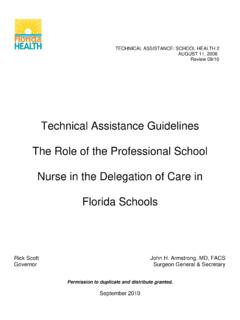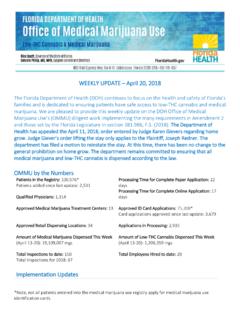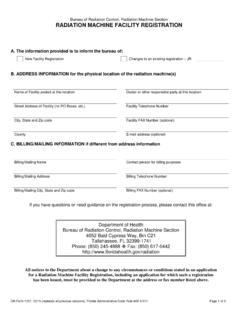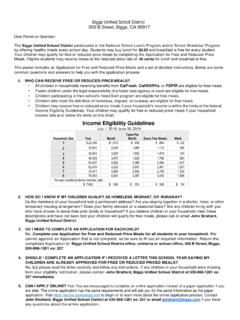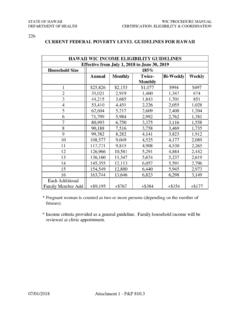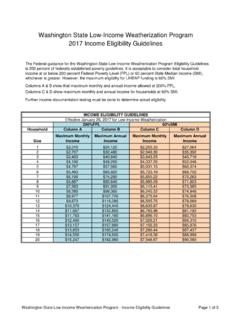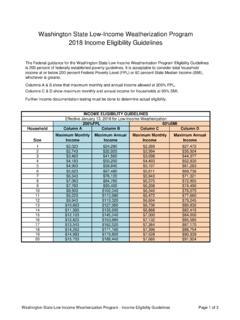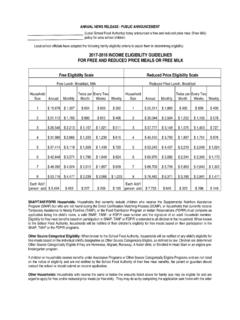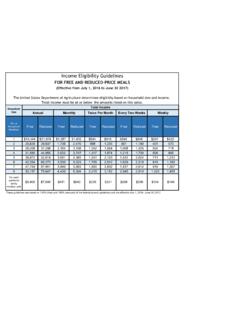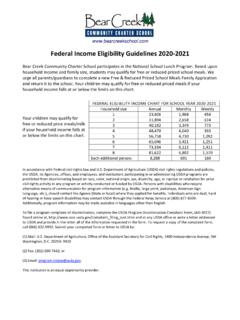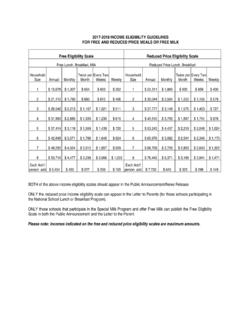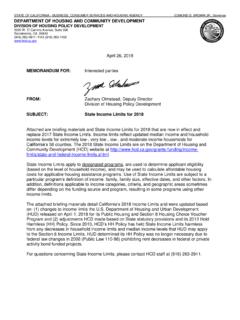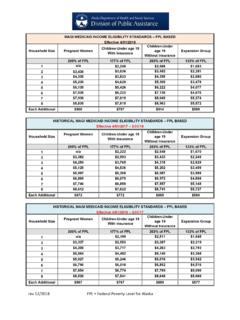Transcription of Eligibility Guide for Child Care Centers
1 Eligibility Guide for Child care Centers FY 2016-2017 Child care Food Program ..building healthy habits for life Florida Department of Health Bureau of Child care Food Programs 4052 Bald Cypress Way, Bin #A-17 Tallahassee, FL 32399-1727 1 In accordance with Federal civil rights law and Department of Agriculture (USDA) civil rights regulations and policies, the USDA, its Agencies, offices, and employees, and institutions participating in or administering USDA programs are prohibited from discriminating based on race, color, national origin, sex, disability, age, or reprisal or retaliation for prior civil rights activity in any program or activity conducted or funded by USDA.
2 Persons with disabilities who require alternative means of communication for program information ( Braille, large print, audiotape, American Sign Language, etc.), should contact the Agency (State or local) where they applied for benefits. Individuals who are deaf, hard of hearing or have speech disabilities may contact USDA through the Federal Relay Service at (800) 877-8339. Additionally, program information may be made available in languages other than English. To file a program complaint of discrimination, complete the USDA Program Discrimination Complaint Form, (AD-3027) found online at: , and at any USDA office, or write a letter addressed to USDA and provide in the letter all of the information requested in the form.
3 To request a copy of the complaint form, call (866) 632-9992. Submit your completed form or letter to USDA by: (1) mail: Department of Agriculture Office of the Assistant Secretary for Civil Rights 1400 Independence Avenue, SW Washington, 20250-9410; (2) fax: (202) 690-7442; or (3) email: This institution is an equal opportunity provider. 2 Child care Food Program Eligibility Guide for Child care Centers TABLE OF CONTENTS Page 3 I. 4 II. Determining 4 III. Required Information from 6 IV. Determining Household 7 V. Determining Household 9 VI. Description of Forms Included in this 9 Forms (attached following page 10): income Eligibility guidelines News Release (Non-Pricing) most Centers use this News Release News Release (Pricing) Free and Reduced-Price Meal Application (English.)
4 Spanish and Haitian-Creole available in MIPS) Parent Letter (Non-Pricing) (English, Spanish, and Haitian-Creole) Parent Letter (Pricing) Child care Application for Enrollment (English, Spanish, and Haitian-Creole) Child Participation Form (English, Spanish, and Haitian-Creole) Enrollment Roster (August - July cycle and October - September cycle) Enrollment Roster Consolidation Form Collection Procedures for Pricing Programs Revised 6/2016 I-085-14 3 INTRODUCTION The Child care Food Program (CCFP) is a federally funded program that reimburses Child care providers for nutritious meals and snacks served to eligible children.
5 In Florida, the Department of Health (DOH), Bureau of Child care Food Programs, administers the CCFP. The purpose of this Eligibility Guide is to provide information on determining the Eligibility of each Child for free or reduced-price meals. It is to be used by independent Child care Centers (including outside-school-hours- care Centers ) and sponsoring organizations of Child care Centers providing services under the CCFP. Sample forms and the current income Eligibility guidelines are included in this document; make copies of the forms as needed. Approved CCFP contractors can also download these forms from our Management Information and Payment System (MIPS).
6 A link to access MIPS is provided on our website In the CCFP, there are non-pricing programs and pricing programs. The most common is a non-pricing program in which the center does not charge separately for meals served. The other is a pricing program, which does charge separately for meals served. The CCFP State Office is located in Tallahassee; the phone number is Program Specialists are located in offices throughout the state; please refer to our website for contact information. Program Specialists or someone from the State Office is available to answer your questions. 4 I. DEFINITIONS The following definitions may be helpful when reading this guidance.
7 Enrolled Child is a Child whose parent or guardian has submitted a signed document to a sponsor or center indicating that the Child is enrolled for childcare. Child means (a) a person 12 years of age and under; (b) a Child of migrant workers 15 years of age and under; and (c) a person with an appropriately documented mental or physical disability who is enrolled in a Child care center that serves a majority of persons 18 years of age and under. Free meal is a meal served under the CCFP to a Child who meets one of the following criteria and has appropriate verifying documentation: Member of a household that meets the income standards for free meals Member of a household receiving Temporary Assistance to Needy Families (TANF) or Food Assistance Program (also known as SNAP or Food Stamp Program) benefits Enrolled in Head Start or Early Head Start Enrolled in the Even Start Literacy Program and has not yet started kindergarten Foster children or children under temporary emergency placement by a court Homeless or institutionalized children Reduced-Price meal is a meal served under the CCFP to a Child from a household that meets the income standards for reduced-price meals.
8 Non-needy meal is a meal served under the CCFP to a Child from a family who does not meet the standards for either free or reduced-price meals. Non-pricing program means the Child care center has no separate identifiable charge for meals served. Pricing program means the Child care center has a separate identifiable charge for meals served. Pricing programs are required to provide the same meals to children eligible for free or reduced-price meals as they provide to children who pay full price for meals. II. DETERMINING Eligibility Independent Child care Centers ( Centers ) and sponsoring organizations of Child care Centers (sponsors) that participate in the CCFP must annually determine the Eligibility of each enrolled Child in order to claim free, reduced-price, or non-needy meals for reimbursement.
9 The Eligibility category determines the amount of reimbursement. In most cases, a Free and Reduced-Price Meal Application (application) is used to collect household information and determine a Child s Eligibility category. There are certain situations when another official document may be used in lieu of an application to determine Eligibility ; those exceptions are explained in Section of this Guide . The Child care center must distribute both pages of the application to the parents of newly enrolled children and children whose Eligibility determination is expiring soon. Print the applications double-sided when possible in order to prevent the pages from being separated.
10 The center must also distribute the accompanying parent letter (both pages) or post a copy of the full letter in an area where parents can read it prior to completing the application. The parent letter provides important information and explains the reason for completing the application to the children s parents. 5 Any adult household member may complete and submit the application. The sponsor or center then reviews the application, compares the information to the income Eligibility guidelines , and determines the Child s Eligibility category. A sponsor may allow its sponsored Centers to determine the Eligibility of the children; however, the sponsor is responsible for ensuring that each Child s Eligibility is determined correctly.
